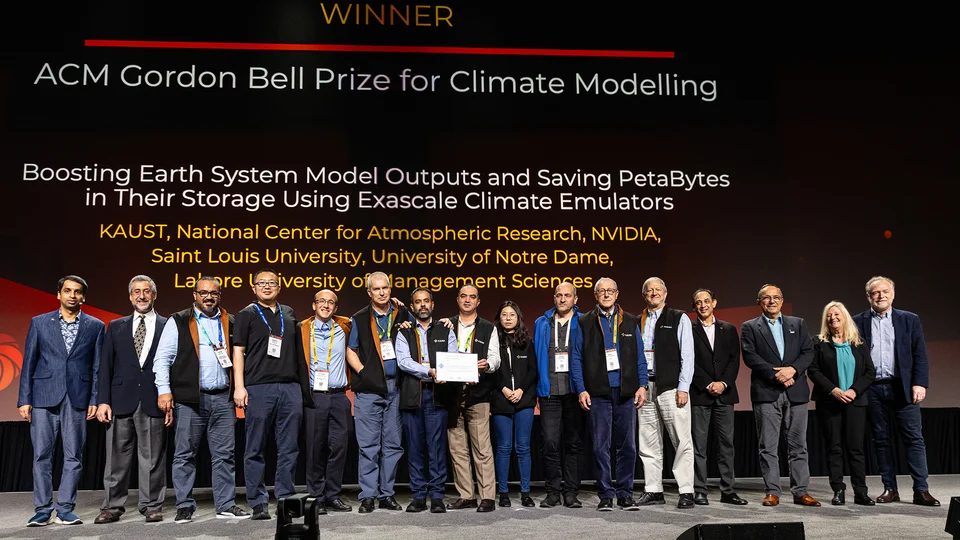
KAUST climate research named finalist for ADIA Lab Climate Data Sciences Award
KAUST team develops breakthrough method for wind data generation, earning finalist spot for ADIA Lab’s climate science award.
About
A research paper co-authored by KAUST Al-Khawarizmi Distinguished Professor of Statistics Marc Genton, KAUST postdoctoral fellow Dr. Yan Song, and former Visiting Professor Zubair Khalid has been named one of five finalists for the ADIA Lab Best Paper Award in Climate Data Sciences: Pioneering Solutions for a Sustainable Future.
The paper, titled "Online stochastic generators using Slepian bases for regional bivariate wind speed ensembles from ERA5," introduces a breakthrough method for generating climate wind data—without the major encumbrance of storing massive datasets.
ADIA Lab, an independent research center based in Abu Dhabi, champions innovation in data and computational sciences. The lab applies artificial intelligence, machine learning, and high-performance computing to address global challenges from climate change and energy transition to cybersecurity and financial inclusion.
Their recent call for papers emphasized the critical role of data science in combating environmental issues. The KAUST team will present their work on Wednesday, April 30, 2025, as part of the final consideration for ADIA Lab’s Best Paper Award.
Regarding the team’s recognition, Professor Genton shared: “We are deeply grateful to be recognized by such a prestigious institution for our contributions to climate science and sustainability. Being named one of the five finalists is a testament to the hard work and dedication of our entire team.”
“It not only underscores the significance of our research but also validates the potential of our approach as an efficient solution for data emulation and storage—an essential advancement for addressing large-scale climate and environmental data challenges. Moreover, our team is the only finalist from the Middle East and South Asia, an additional source of pride for KAUST and the region,” he added.
A game-changing advancement for climate data analysis
Climate researchers often rely on reanalysis datasets like ERA5, which provide detailed hourly snapshots of the Earth’s atmosphere, land and oceans. These datasets are built by merging observational data from satellites, weather stations and other sources with powerful climate models. While rich in information, they come with a cost—vast amounts of storage and computational power.
To overcome this, the team’s award-nominated paper presents a breakthrough online stochastic generator (OSG) that can rapidly and accurately generate wind speed data for any region, using a fraction of the typical storage requirements. This dynamic tool updates itself in real time, eliminating the need to reprocess large datasets and allowing for near-instant analysis.
It employs a powerful mathematical method—the Slepian concentration technique—that focuses analysis on specific areas—such as the Arabian Peninsula (ARP)—by filtering out irrelevant data. This enables more targeted, efficient analysis while minimizing storage needs, opening the door for real-time climate monitoring and forecasting.
Professor Genton explained the work’s broader impact: “The ability to rapidly emulate near-real-time wind data is particularly valuable for assessing wind energy potential in the ARP region and for future planning. This is a crucial part of Saudi Arabia’s efforts to diversify its energy sources and reduce dependence on fossil fuels. By improving the analysis of renewable energy sources such as wind, our research can help drive sustainable energy solutions, aligning with the country’s vision for a sustainable and innovative future.”
The KAUST-developed method was tested through two case studies using both long and short data blocks. In each case, the OSG delivered accurate results comparable to traditional, resource-intensive models.
“Our OSG offers a breakthrough, enabling climate researchers to generate reliable climate ensembles in near real-time, with significantly less storage and computational resources.” Dr. Song emphasized. “This makes it more accessible and affordable for researchers, policymakers, and organizations working with large-scale climate data.”
Driving sustainable solutions in climate science
The Spatio-Temporal Statistics and Data Science (STSDS) group at KAUST has long been at the forefront of developing advanced stochastic generators for climate data emulation. By combining expertise in statistics, climate science, and computer science—and leveraging supercomputing resources—they have significantly enhanced the performance and applicability of their models.
Their contributions have earned wide recognition, most notably as part of the 2024 ACM Gordon Bell Prize for Climate Modeling winning team for their work on exascale climate emulators. Moving forward, the STSDS group is driven to redefine the frontiers of statistical science—delivering bold, data-driven innovations that power sustainable solutions for our planet’s climate future.
REFERENCE
- Song, Y., Khalid, Z., and Genton, M. G. Online stochastic generators using Slepian bases for regional bivariate wind speed ensembles from ERA5. arXiv preprint arXiv:2410.08945 (2024). | article


